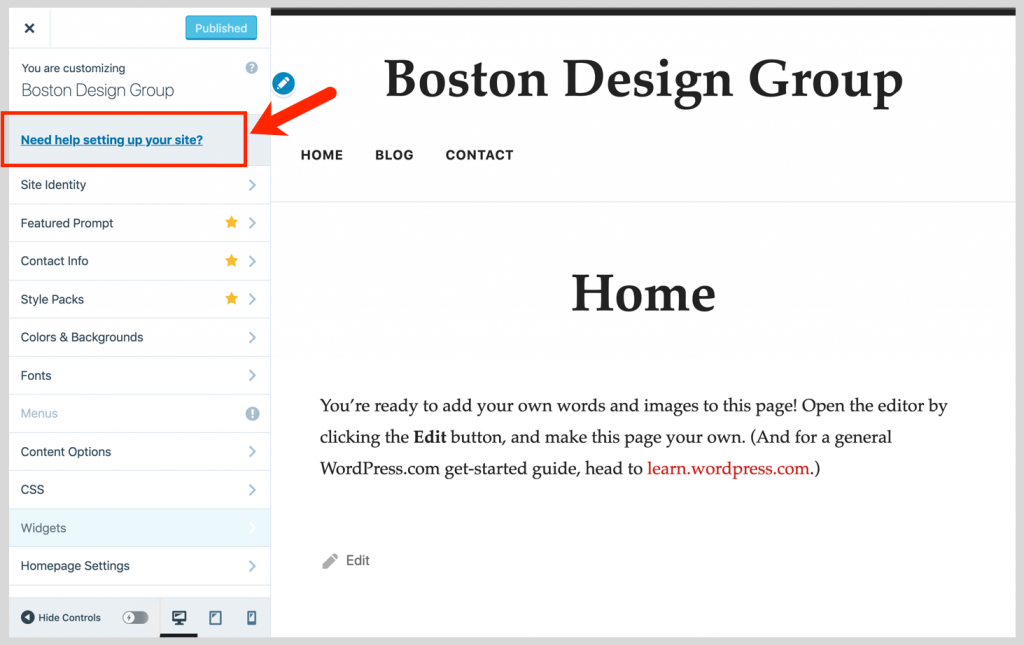Table of Contents
What is WordPress?
Is WordPress Good for Business Sites?
What Features Does WordPress Offer for Business?
Are There Downsides to WordPress?
What Are the Alternatives to WordPress?
How Does WordPress Work With WooCommerce?
What Are the Popular Alternatives to WooCommerce?
Is WordPress Best for Your Business Website?
What is WordPress?
WordPress is a content management system (CMS) that simplifies the creation and management of content.
Since its release in 2003, WordPress has grown exponentially. Today, the platform powers 35% of the web.
Hosted vs. Self-Hosted WordPress
There are two ways to use WordPress:
- Self-hosted: You can download the complete platform from WordPress.org for use on any web hosting environment you set up and control. With this option, you get the greatest control over your site but have to manage all the technical elements independently.
- Hosted: If self-hosting isn’t for you, you can sign up at WordPress.com to use an online-only version of the same application. You can access your WordPress dashboard online, and you don’t have to worry about the infrastructure powering your site.
Is WordPress Good for Business Sites?
WordPress caters to users across the spectrum and bills its Business plan as perfect for businesses selling online but ideal for anyone who wants more control over their CMS.
Let’s take a look at how the Premium, Business, and e-commerce plans stack up.
WordPress Personal Plan
The WordPress Premium plan is ideal for content creators who want to publish their works online, and it comes with:
- A free domain name for the first year
- Jetpack essential features (an optimization tool to make sure your WordPress site performs well)
- Removal of all WordPress.com ads
WordPress Premium Plan
The WordPress Premium plan is the best choice for entrepreneurs and freelancers who are building up their brand. This plan comes with:
- Access to premium themes and advanced design customization
- Advanced social media tools, including easy integration, advanced scheduling of posts, and post promotion tools
- Support for Simple Payments via PayPal, as well as site monetization via ad revenue, PayPal buttons, and more
- VideoPress for video management
WordPress Business Plan
The WordPress Business plan is a good fit for small businesses. This plan comes with the Premium features listed above and also includes the following:
- Enhanced SEO tools
- The ability to upload themes and plugins
- Support for Google Analytics integration
- Unlimited access to premium themes, as well as advanced features to customize these designs
- Unlimited storage space
In less than two minutes, we created this basic e-commerce site. On the left, there’s a helpful link to get tutorials for setting up your site. You can also get live assistance.
WordPress E-Commerce Plan
The WordPress E-commerce plan comes with all the Business plan features, plus the ability to accept payments in 60-plus countries and integrate with top shipping carriers. This plan is essential if you want to sell anything online.
While any site may gain from the powerful SEO features and customization, if you are a small business site looking for a basic online presence, you probably don’t need the Business or e-commerce plans.
WordPress Plan Comparison Table
Here is a quick snapshot detailing each plan’s cost and capacity difference.
| Personal | Premium | Business | eCommerce | |
| Online selling features |
|
|
|
|
| Ideal for | Digital content creators | Entrepreneurs and freelancers | Small businesses | Online stores |
| Themes | Free | Free and premium themes | Free and premium themes | Free and premium themes |
| Storage | 6 GB | 13 GB | 200 GB | 200 GB |
| Price per month | $4.00 | $8.00 | $25.00 | $45.00 |
What Features Does WordPress Offer for Business?
WordPress offers a broad range of features for any business. We’ll explain how these additional features benefit your site if you’re still unsure.
Custom Plugins
In the WordPress universe, a plugin is a piece of software that adds features or extends existing functionality available on the WordPress platform.
Plugins are part of the reason why WordPress is so powerful.
WordPress’s extensibility and flexibility make it possible to support whatever projects you have in mind. When you’re on the Business plan, you can take this further by uploading custom plugins.
Custom Themes
Similar to plugins, themes are a way to customize your WordPress installation. Many people see them as a way to control the look of your site, but they can also be a simple way to install functionality.
Business users are not restricted to options available in the WordPress theme store.
Google Analytics Integration
All WordPress users get built-in status tracking that includes information on the number of new posts, likes, and comments, as well as visitor traffic and activity.
However, Google Analytics offers features like funnel reports to track your visitors’ path through your site, get conversion rates, and so on. This is ideal for e-commerce.
Users with the Business plan get support for Google Analytics, though it is disabled by default.
You can easily enable this by going to Settings > Traffic under the My Sites area of your WordPress admin dashboard.
Search Engine Optimization (SEO)
WordPress.com’s Business plans come with special SEO features. You can add meta descriptions, custom title formats, and search and social previews.
The only other WordPress plans to offer these SEO tools are the Jetpack Premium and Professional plans for self-hosted sites.
Jetpack Search
Business plan users can access Jetpack Search — a powerful onsite search tool.
According to WordPress.com, the enhanced search functionality is ideal for all types of organizations, from news sites to e-commerce.
Advanced E-Commerce Features
In addition to WooCommerce, you can start selling easily on WordPress with a Premium plan.
You can activate Simple Payments with a few clicks. Setting up a store takes a few more clicks. To set up a store on WordPress, you need to check the following boxes:
- Business plan user
- Based in the United States or Canada
- Previously installed a custom theme or plugin
Eligible sites can create a store from their dashboard.
The WordPress e-commerce plan takes online selling to the next level. You’ll get support to accept payments from clients across the world and live rates from major shipping carriers.
Are There Downsides to WordPress?
We’ve discussed the upsides of WordPress and its benefits for small business websites. However, there are some downsides to using WordPress. For example, 90% of all CMSs hacked in 2018 were WordPress websites.
Some of these negatives apply to WordPress in general, while other notes are specific to the top-end plans from WordPress.com.
- Hackers target WordPress: Because WordPress is the most commonly used CMS in the world, it is a desirable target for hackers. According to research from Sucuri, 90% of all hacked CMS websites in 2018 were WordPress sites.
- Frequent updates: Keeping your site updated can be time-consuming, especially if you’ve taken advantage of WordPress’s robust themes and plugins. You’ll need to update the WordPress core itself. Moreover, you’ll need to ensure that your theme and individual plugins are updated and that nothing is broken.
- Speed and performance issues: Depending on your chosen theme and the plugins you’ve installed, your WordPress site might become sluggish. Developers add code to themes and plugins to increase functionality, creating bloat and slowing down your site.
- WordPress.com’s pricey business hosting: The WordPress.com Business plan comes with an expensive price tag. This may put it out of reach for many entrepreneurs starting out, but you get value for money.
What Are the Alternatives to WordPress?
WordPress isn’t the only website-building option for businesses. Here are some alternatives that you might consider.
Squarespace
Squarespace is a popular website builder that makes it easy to build a professional-looking website.
Like WordPress.com, Squarespace is a fully-hosted solution, so it is a one-stop shop for everything you need for a functional website.
Check our Squarespace review for all the facts if you need help deciding between the two.
Drupal
Drupal is a CMS similar to WordPress: it is open source, has a strong community supporting the product, and offers extensibility via themes and modules.
If you’re willing to put in the time to conquer the learning curve, you’ll have a powerful, secure platform.
How Does WordPress Work With WooCommerce?
WordPress.com offers the WooCommerce plugin, a robust add-on that turns your WordPress site into a full e-commerce platform.
WooCommerce also powers WordPress’ e-commerce plan.
You’ll get the ability to sell physical and digital goods and have everything you need to manage physical inventory, offer a shopping cart, and handle the checkout and payment processes.
Most e-commerce platforms provide these features, but certain aspects make WooCommerce stand out from many other e-commerce options.
Extensions
WooCommerce is a plugin for WordPress, but you can also add features and functionality to WooCommerce with extensions.
Extensions provide functionality like setting up subscription plans, memberships, and dynamic prices.
Payment Processing
One of the biggest challenges with online stores is offering a sufficient number of secure, simple payment options. Checkouts with clunky interfaces can increase cart abandonment and reduce conversions.
WooCommerce comes with extensive functionality to accept major credit cards, bank transfers, and cash on delivery.
WooCommerce integrates with over 140 region-specific payment gateways, which is nice if you have an international clientele.
Community
WordPress is supported by a huge community, and WooCommerce’s following is similar.
There are hundreds of contributors to the WooCommerce repository on GitHub, and there are many translations of the plugin available. You can even join in on a WooCommerce Meetup local to you!
What Are the Popular Alternatives to WooCommerce?
There are a lot of upsides to using WooCommerce, but it’s not a great fit for everybody.
If you’re in the market for an e-commerce platform, here are some alternatives for you to consider.
- OpenCart is an open-source, free-to-use e-commerce platform with everything you need to get your online business up and running. Its features include easy product, customer, and order management, as well as built-in support for tax calculations, coupon code support, and more.
- PrestaShop is an open-source e-commerce application built on a technology stack similar to WordPress and WooCommerce. It’s flexible and easy to spin up. A big difference is that PrestaShop is a standalone product, and WooCommerce is a WordPress plugin. The core platform is free-to-use, but you can purchase add-ons and themes from the marketplace.
- Shopify is an all-in-one e-commerce platform, so in addition to getting everything you need for a website, you’ll get everything you need to run an online store, such as shopping cart, checkout functionality, shipping integration and tax calculators.
Is WordPress Best for Your Business Website?
Setting up a business website can be daunting, but there are many different options available, and it’s easy to see why WordPress is the most popular.
It’s affordable, has plenty of room to enhance functionality, and is widely supported.
Businesses selling online, and those who want greater control over their website, might gain from the WordPress Business and e-commerce packages. The ability to upload custom plugins and themes gives you the power to create a unique online presence.
Review our article on why you might find WordPress a great option. If you’re eager to get going, you can sign up with WordPress.com now to get our exclusive discount.



